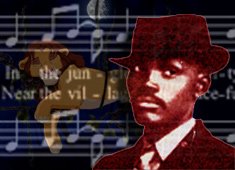A weem-o-way, a weem-o-way
I thought this was an interesting article. I know a lot of music historically has been ripped off of the original authors, esp. African Americans, whether we are talking the Lion Sleeps Tonight or blues or rock ‘n’ roll that was re-recorded by white artists. It’s good to see it being addressed, thanks to an investigative exposé by Rolling Stone. I find it to be a fascinating bit of music history:
 Women win battle in ‘Lion Sleeps’ case
Women win battle in ‘Lion Sleeps’ case
JOHANNESBURG, South Africa (AP) — Three impoverished South African women, whose father wrote the song known as The Lion Sleeps Tonight, have won a six-year battle for royalties in a case that could affect other musicians. The story surrounding the song that never seems to go out of date amounts to a rags-to-riches tale, replete with racial overtones.
No one is saying how many millions will go to the daughters of the late composer Solomon Linda, who died in poverty from kidney disease in 1962 at age 53. But the family’s settlement last month with New York-based Abilene Music gives Linda’s heirs 25% of past and future royalties and has broad implications.
Linda composed his now-famous song in 1939 in one of the squalid hostels that housed black migrant workers in Johannesburg. According to family lore, he wrote the song in minutes, inspired by his childhood tasks of chasing prowling lions from the cattle he herded. He called the song Mbube, Zulu for lion.
It was sung, in true Zulu tradition, a cappella. Linda’s innovation was to add his falsetto voice, an overlay of haunting “eeeeeees,” to the baritone and bass main line. To this day, this style is called Mbube in South Africa. The song sold more than 100,000 copies over a decade, probably making it Africa’s first big pop hit.
In the 1950s, at a time when apartheid laws robbed blacks of negotiating rights, Linda sold worldwide copyright to Gallo Records of South Africa for 10 shillings — less than $1.70.
The song became one of the best known songs in the world as The Lion Sleeps Tonight, attributed to George Weiss, Hugo Peretti and Luigi Creatore. American singer Pete Seeger adapted a version that he called “Wimoweh,” making it a folk music staple.
Owen Dean, South Africa’s leading copyright lawyer, argued successfully for Linda’s family that under the British Imperial Copyright Act of 1911, which was in force in South Africa at the time Linda composed his song, all rights revert to the heirs, who are entitled to renegotiate royalties. “Now the way has been shown,” Dean told The Associated Press. “Others in similar circumstances can fight such injustice, and I have no doubt that there are other people in this position.” The 1911 act affects all countries that were part of the British Empire at that time — a third of the world.
It remains to be seen how the settlement with Abilene, which holds the copyright to the popular songs that grew from Linda’s composition, will affect his family. Abilene couldn’t immediately be reached for comment.
Kevin Chang, a Jamaican reggae expert, said the case means that “musicians living in poverty, and other artists, may finally be rewarded for their work.” Chang believes the decision could be applied to an ongoing British court case in which Carlton Barrett of Bob Marley and the Wailers is suing Marley’s estate for royalties, arguing songs he co-authored are being credited only to Marley.
Websites list hundreds of versions of the Lion, including many top of the pops over the years. Folk, swing, minstrel, big band, reggae and R&B versions have been sung over the years. The New Zealand Army had it as a favorite tune for a while. The song’s captivating rhythm poured from the soundtrack in Disney’s blockbuster musical The Lion King— one of at least 15 movies in which it’s been featured.
“The musical was netting millions of dollars and Solomon Linda’s daughters were trying to survive as domestic servants, not earning enough to feed their families,” Dean told the AP. Along the way, the song is said to have earned some US$15-million in royalties – but not for Linda. The musician died in 1962 with less than R100 in his bank account. His widow couldn’t afford a headstone for his grave.
*******************************************************
Also, read this longer, riveting take on the same story from the SouthAfrica.Info page, and here is one example of the song’s varied appeal:
“The Lion Sleeps Tonight (live)” – R.E.M.
What a great tune, another one that you can’t be unhappy while listening to. It makes me feel like I should be heading off to summer camp in a hot car with sticky, sweaty vinyl seats, singing at the top of my voice with the windows down.



 Name: Heather Browne
Name: Heather Browne